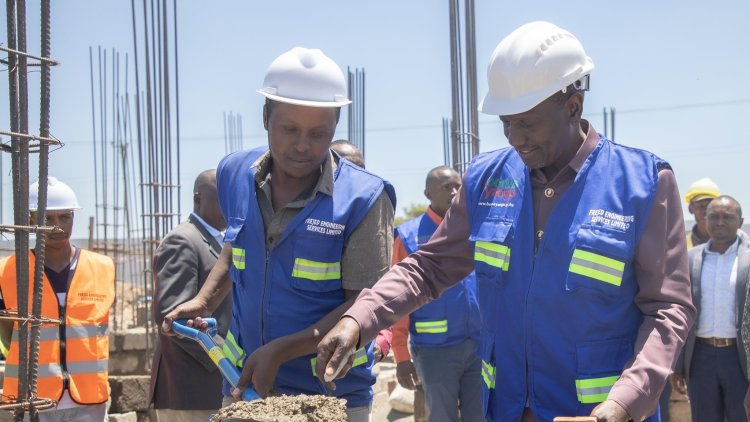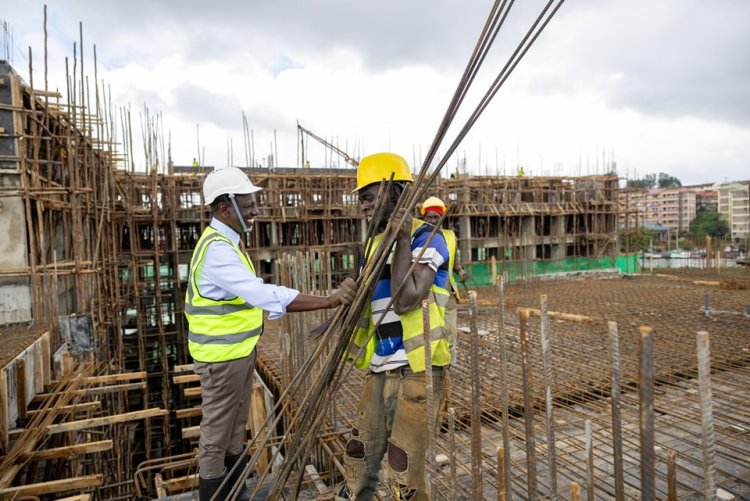Scrap 10 Percent Deposit & Other Key Proposals In Ruto Housing Bill 2023
Arguably the most notable recommendation is the removal of the 10 per cent deposit requirement depicted in Section 31 (2a) which Kenyans had to meet to be eligible to afford the housing units.

The Joint Committee of the Departmental Committee on Finance and National Planning & Departmental Committee on Housing, Urban Planning and Public Works has released its report on the Affordable Housing Bill 2023, with five significant proposals for its amendments.
Arguably the most notable recommendation is the removal of the 10 per cent deposit requirement depicted in Section 31 (2a) which Kenyans had to meet to be eligible to afford the housing units.
The lawmakers had agreed that the requirement risked locking out Kenyans from owning homes, and the proposal seeks to lower the entry barrier for prospective owners seeking to own a home for the very first time in their lives.

An illustration of the Affordable Housing Programme by Boma Yangu Initiative under the National Housing Corporation. /BOMA YANGU KENYA
Refunds For Deposits
Another proposal would see Kenyans free to make savings towards meeting the deposit for their desired houses, though the committee cautioned that some Kenyans may miss out on the houses and require a refund given the demand anticipated for housing.
According to the proposed bill, the refunds are to be done in 90 days but the MPs recommended that the time frame be cut down by 30 days.
Those Who Really Need Affordable Housing
The MPs also recommended amending Section 30(2c) to tie the allocation of housing units to unique identifiers, such as one Kenya Revenue Authority (KRA) PIN per house to ensure fairness and prevent abuse of the system.
This move is aimed at curbing speculative buying and ensuring that the benefits of the program reach those in genuine need of affordable housing.
"On clause 33, the stakeholders recommended the deletion of the clause in its entirety to address concerns about potential exploitation by the wealthy using proxies. According to their submission, allowing the clause to remain intact could facilitate loopholes that enable individuals of higher economic status to exploit the system unfairly, potentially disadvantaging those in lower income brackets," stakeholders opined during the public participation process.
"The Committee noted stakeholders' concerns about the potential misuse of the provision and recommended its deletion. Further, it also recommended that the Bill be amended to provide safeguards for instance one KRA pin one house, or any other unique identifier," the Committee responded.
Housing Committees
Furthermore, the committee proposed the creation of 47 Housing Committees, one for each county, to facilitate engagement and cooperation on housing matters, underscoring the importance of local involvement in national initiatives.
Universities & TVETs
Also proposed by MPs was for universities and other institutions of higher learning to be considered in the programme after concerns were raised during the public participation by people from higher learning institutions of students being excluded from the allocation of affordable houses.
Another major recommendation that the Committee adopted is the involvement of the university and TVET students in the house construction.
"The Committee agreed to amend the Bill to provide for internships for students in TVET institutions situated within areas where affordable housing is being undertaken," read the report in part.
It is worth noting that the Affordable Housing Programme received praise from the Kenya Universities' Student Organisation (KUSO), terming it a solution to the dismal living conditions students endure during their pursuit of education.
Locally Made
In a move aimed at boosting local economies and ensuring sustainability, the committee has supported the proposal that at least 50% of all materials and labour used in affordable housing projects be sourced locally, with an emphasis on standardization to maintain quality.
Reduction On Penalties & Harsher Penalties For Abuse Of Housing Levy Funds
The Committee also recommended that Section 7 of the bill be amended to scale down the 3.0% penalty (of the unpaid amount) for one falling into arrears on remittance to the fund, with the Tax Procedures Act penalty set to apply. The accrued penalties will go towards slum upgrading.
Penalties for misappropriating affordable housing levy funds are set to become more severe, aligning with the Anti-Corruption Act, reflecting the committee's zero-tolerance policy towards fund mismanagement. This is from the fine not exceeding Ksh10 million or jail term not exceeding 5 years to align with Section 48 of the Anti-Corruption Act.
Proposals That Were Rejected
However, not all proposals saw the light of day. For instance, the proposal to do away with Section 5 of the Bill which provides for the mandatory requirement that employers match their employees' contribution with 1.5% was rejected, with the Committee arguing that the fact that the matching is tax deductible should be sufficient while computing income tax.
However, the committee endorsed a proposal to clean up the possible conflict between Section 4(2b) targeting Kenyans not on a payroll and Section 5 which provides for employer matching.
The committee also rejected the proposal to base deductions on basic salary rather than gross salary, maintaining the current stance that deductions should be calculated from the gross salary.

President William Ruto interacting with a construction worker at the Kibra Affordable Housing project on November 22, 2023. /PCS
Additionally, the proposal to extend the remittance window from the 9th to the 12th working day was also dismissed, highlighting the importance of timely remittance of funds.
The Committee also trashed concerns regarding collaboration between National and County governments, arguing that the Bill provides for the Council of Governors to appoint a member to the Affordable Housing Board.
The committee further threw out concerns regarding the transfer of land from the county to national governments for the affordable housing project.
Surprisingly, the committee rejected the idea of a mandatory waiting period between the purchase and sale of affordable housing units, a measure that was intended to curb speculative ventures.
The MPs also rejected proposals by a section of employers who requested to be excluded from topping up the deductions of their employees.
The report was tabled in the House for debate on Thursday, February 15, 2024.

 admin
admin 




